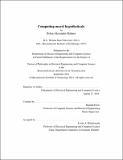| dc.description.abstract | Our moral judgments depend on our ability to imagine what else might have happened: we forgive harms that prevent greater harms, we excuse bad outcomes when all others seem worse, and we condemn inaction when good actions are within reach. To explain how we do this, I built a computational model that reads and evaluates short textual stories, computing hypotheticals in order to make moral judgments.
I identify what specialized knowledge we need in order to know which hypothetical alternatives to consider. I show how to connect abstract knowledge about moral harms to the particular details in a story. Finally, I show how the system can assess outcomes in a purely qualitative, human-like way by decomposing outcomes into their harmful components; I argue that—as in real life—many outcomes are incomparable.
I support my theoretical claims with references to the cognitive science and philosophical literature, and I demonstrate the system’s explanatory breadth with diverse examples including escalating revenge, slap-on-the-wrist, preventive harm, self-defense, and counterfactual dilemma resolution.
The key insight is that hypothetical context modulates understanding. With this system, I shed light on what is needed to grasp hypothetical context as effortlessly and automatically as we humans do. And I lay the groundwork for moral reasoning systems that are as nuanced, imaginative, and articulate as we humans are. | |
